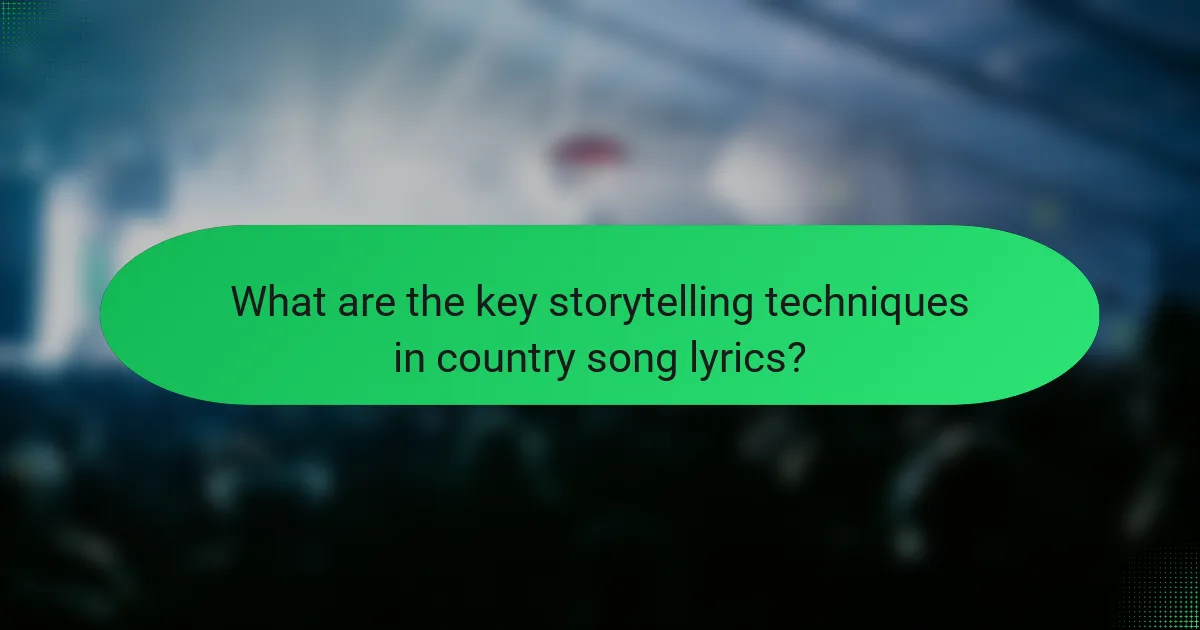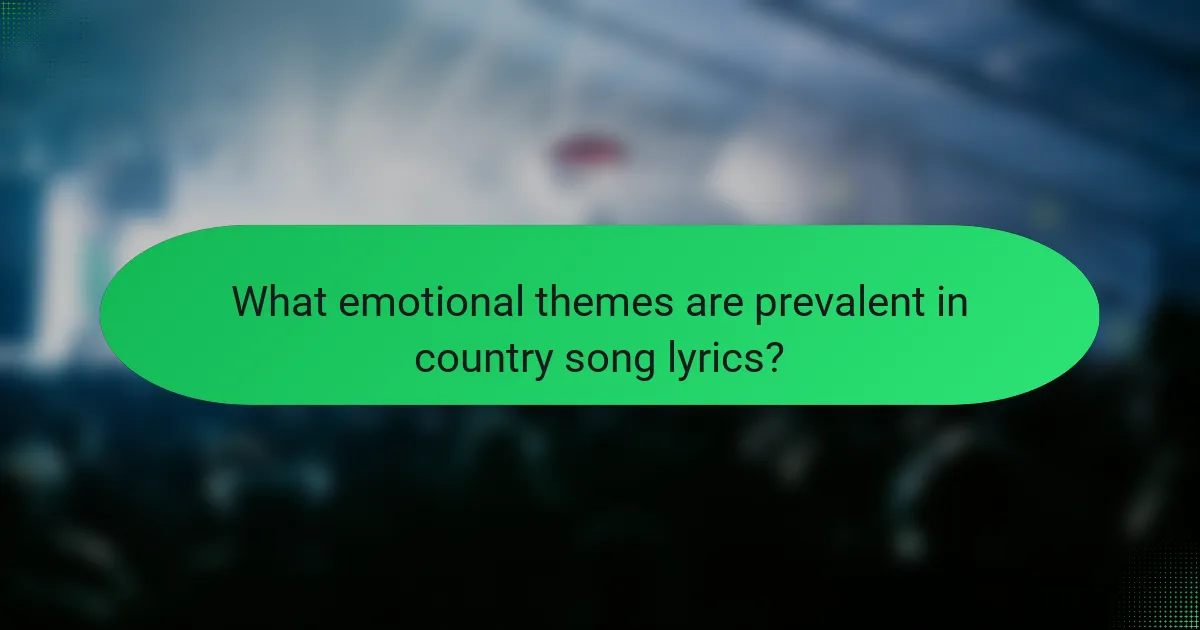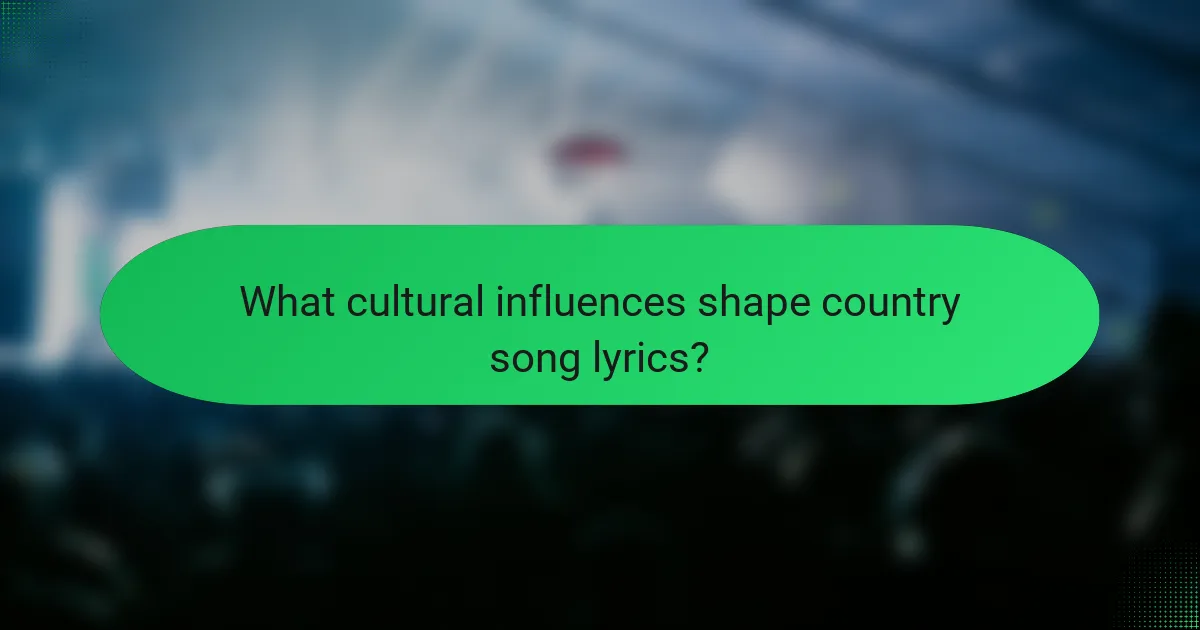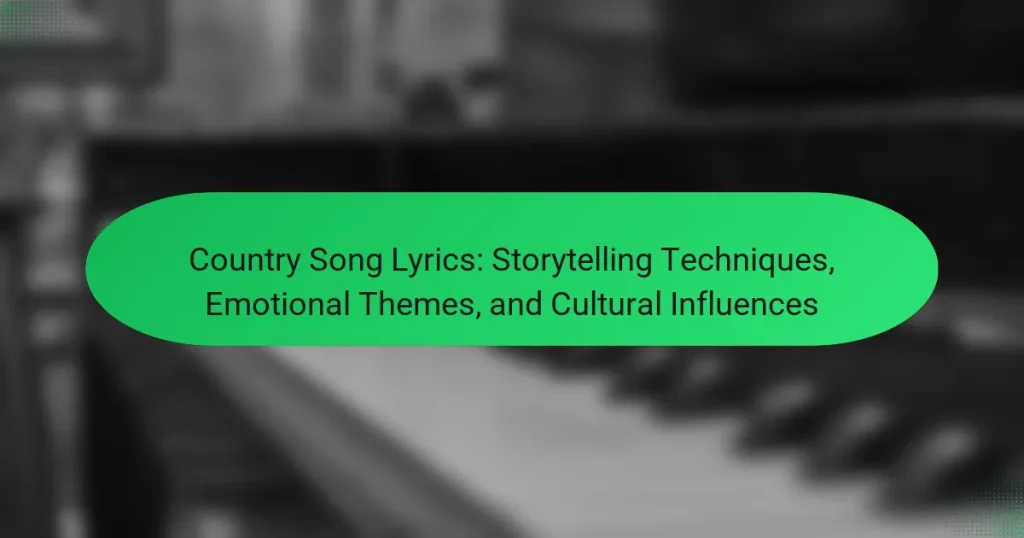Country song lyrics are characterized by key storytelling techniques, including vivid imagery, relatable characters, and emotional narratives. These elements create strong connections with listeners through themes of love, heartbreak, and nostalgia. The incorporation of dialogue adds authenticity, while a structured narrative enhances engagement. Cultural influences, such as regional traditions and historical events, shape the lyrical content, reflecting societal changes and diverse community experiences. This article explores how these storytelling techniques, emotional themes, and cultural influences contribute to the richness of country music.

What are the key storytelling techniques in country song lyrics?
Key storytelling techniques in country song lyrics include vivid imagery, relatable characters, and emotional narratives. Vivid imagery creates a strong sense of place and emotion. For example, descriptions of landscapes or personal experiences help listeners visualize the story. Relatable characters often reflect everyday life, making it easier for audiences to connect. Emotional narratives convey feelings of love, loss, and heartache, which resonate deeply with listeners.
Additionally, the use of dialogue adds authenticity to the storytelling. It allows characters to express their thoughts and emotions directly. A clear structure, often following a beginning, middle, and end, helps to guide the listener through the story. These techniques combine to create engaging and memorable songs that reflect the cultural experiences of the country music genre.
How do narrative structures shape the storytelling in country songs?
Narrative structures significantly shape storytelling in country songs by providing a framework for emotional expression. These structures often include elements like a clear beginning, middle, and end. This organization helps convey relatable themes such as love, loss, and resilience. The use of first-person perspective is common, allowing listeners to connect deeply with the narrator’s experiences.
Additionally, the incorporation of vivid imagery and specific details enhances the storytelling. For example, references to familiar settings or cultural symbols ground the narrative in reality. This connection to the listener’s own life experiences makes the songs more impactful.
Research indicates that country songs frequently employ traditional storytelling techniques. According to a study by the University of Southern California, songs with strong narrative elements tend to resonate more with audiences. This resonance is crucial in a genre that values authenticity and emotional depth. Thus, narrative structures are essential in shaping the storytelling of country songs, making them memorable and relatable.
What are common narrative arcs found in country song lyrics?
Common narrative arcs found in country song lyrics include love and heartbreak, personal struggle, and storytelling about everyday life. The love and heartbreak arc often depicts the joy of falling in love followed by the pain of loss. Personal struggle narratives often focus on overcoming adversity, such as financial hardship or addiction. Everyday life storytelling showcases relatable experiences, such as family gatherings or small-town life. These arcs resonate with listeners due to their emotional authenticity and cultural relevance. Country songs often draw from real-life experiences, making the narratives relatable and impactful.
How do character development and dialogue enhance storytelling?
Character development and dialogue enhance storytelling by creating relatable and dynamic characters. Relatable characters allow audiences to connect emotionally with the narrative. Dynamic characters evolve over time, reflecting personal growth or change. This evolution keeps the audience engaged and invested in the story.
Dialogue serves as a tool for revealing character traits and motivations. It provides insights into relationships and conflicts. Effective dialogue can convey emotions and subtext, enriching the narrative. In country songs, for instance, dialogue often reflects authentic experiences and cultural contexts. This connection to real-life situations makes the storytelling more impactful and memorable.
What role do imagery and symbolism play in country song lyrics?
Imagery and symbolism are crucial in country song lyrics. They enhance emotional connection and storytelling. Imagery creates vivid mental pictures, allowing listeners to visualize scenes. Symbolism conveys deeper meanings beyond literal interpretations. For example, a broken bottle may symbolize heartbreak. These techniques resonate with audiences by evoking shared experiences. They also reflect cultural values and traditions inherent in country music. This use of imagery and symbolism enriches the lyrical narrative.
How can vivid imagery evoke emotions in listeners?
Vivid imagery can evoke emotions in listeners by creating strong mental pictures. These detailed descriptions engage the imagination and stimulate emotional responses. For instance, phrases that describe a sunset or a heartbreak can trigger personal memories. This connection leads to feelings of nostalgia, joy, or sadness. Research shows that sensory details enhance emotional engagement in music. A study by Bruner and Pruitt (2019) indicates that imagery in lyrics can significantly affect listener emotions. By painting a vivid scene, songwriters tap into shared human experiences, making the emotional impact more profound.
What symbols are frequently used in country music, and what do they represent?
Common symbols in country music include the cowboy, truck, and heart. The cowboy represents freedom and rugged individualism. Trucks symbolize working-class life and nostalgia for simpler times. Hearts often convey love, heartbreak, and emotional struggles. Other symbols like the American flag signify patriotism and pride in rural heritage. These symbols reflect the themes of resilience, love, and cultural identity prevalent in country music.
Why is authenticity important in the storytelling of country songs?
Authenticity is important in the storytelling of country songs because it fosters a genuine connection with listeners. Country music often reflects real-life experiences, emotions, and cultural narratives. Authentic storytelling resonates deeply with audiences who seek relatable content. Songs that convey honesty and personal truths create a stronger emotional impact. For example, artists like Johnny Cash and Dolly Parton are celebrated for their authentic narratives. Their lyrics often draw from personal struggles and triumphs, enhancing listener engagement. Research shows that authenticity in music can lead to greater listener loyalty and emotional response. This connection is vital for the genre’s success and cultural relevance.
How does personal experience influence the songwriting process?
Personal experience significantly influences the songwriting process by providing authentic material for lyrics. Songwriters often draw from their own lives, reflecting emotions, struggles, and triumphs. This connection to personal experience makes songs relatable to listeners. For instance, many country songs narrate stories of love, heartbreak, and resilience, rooted in the songwriter’s real-life events. Research shows that songs based on personal narratives resonate more with audiences, enhancing emotional engagement. This is evident in the success of artists like Taylor Swift, who frequently incorporates her experiences into her music. Personal experiences thus serve as a powerful foundation for songwriting, enriching the storytelling aspect of country music.
What are the consequences of inauthentic storytelling in country music?
Inauthentic storytelling in country music leads to a disconnect between artists and their audience. This disconnect can result in decreased listener engagement. Audiences often value genuine experiences and emotions in lyrics. When artists fail to deliver authenticity, they risk alienating their fan base. Inauthenticity may also lead to criticism from industry peers and fans alike. For example, artists like Sam Hunt faced backlash for straying from traditional country themes. Furthermore, inauthentic storytelling can dilute the cultural significance of the genre. It may contribute to a homogenization of music that lacks depth and originality. Ultimately, the consequences can diminish the overall impact of country music as a storytelling medium.

What emotional themes are prevalent in country song lyrics?
Emotional themes prevalent in country song lyrics include love, heartbreak, and nostalgia. Love often reflects romantic relationships and deep connections. Heartbreak captures feelings of loss and separation. Nostalgia evokes memories of simpler times and past experiences. Other themes include resilience, family values, and rural life. These themes resonate with listeners, creating a strong emotional connection. Research indicates that country music often mirrors real-life experiences, enhancing its relatability.
How do love and heartbreak manifest in country songs?
Love and heartbreak manifest in country songs through storytelling and emotional expression. Country songs often depict personal experiences of love, loss, and longing. Lyrics frequently explore themes of nostalgia, regret, and heartache. Storytelling techniques, such as vivid imagery and relatable characters, enhance emotional connection. For instance, songs like “Whiskey Lullaby” by Brad Paisley illustrate profound grief and heartbreak. The narrative style allows listeners to empathize with the characters’ emotions. Additionally, common motifs include rural settings and everyday life, grounding the themes in relatable experiences. This combination of storytelling and emotional depth resonates with audiences, making love and heartbreak central to country music.
What are the different perspectives on love expressed in country lyrics?
Country lyrics express various perspectives on love, highlighting themes of heartbreak, nostalgia, and devotion. Many songs portray love as a profound, life-changing experience. For instance, artists often describe the joy of falling in love, emphasizing the emotional highs. Conversely, heartbreak is a prevalent theme, with lyrics detailing the pain of lost love and longing.
Nostalgia also plays a significant role, as many songs reflect on past relationships with a sense of yearning. Devotion is another common perspective, where love is depicted as unwavering and steadfast, often celebrating commitment. These themes resonate with listeners, showcasing the multifaceted nature of love in country music.
How do country songs portray the process of healing from heartbreak?
Country songs portray the process of healing from heartbreak through storytelling that emphasizes emotional resilience. They often depict themes of loss, reflection, and eventual acceptance. Lyrics frequently illustrate the journey from pain to recovery. Many songs highlight personal anecdotes and relatable experiences. This connection fosters a sense of community among listeners. The use of metaphors and vivid imagery enhances emotional impact. Instruments like acoustic guitars and fiddles complement the narrative, creating an intimate atmosphere. Overall, country music effectively captures the complexities of heartbreak and healing.
What role does nostalgia play in country music themes?
Nostalgia plays a significant role in country music themes. It evokes memories of simpler times and personal experiences. Many country songs reflect on past relationships, family traditions, and rural life. This sentiment resonates deeply with listeners, creating an emotional connection. For instance, songs like “Take Me Home, Country Roads” by John Denver highlight a longing for home and familiarity. Research shows that nostalgia can enhance emotional well-being, making it a powerful tool in songwriting. The frequent use of nostalgic imagery in lyrics reinforces the genre’s cultural roots and storytelling tradition.
How do memories and past experiences shape the lyrics?
Memories and past experiences significantly influence lyrics in country songs. They provide authentic narratives that resonate with listeners. Songwriters often draw from personal histories to create relatable themes. This connection fosters emotional engagement with the audience. Research shows that autobiographical memories enhance creativity in songwriting. For instance, a study by D. A. Hargreaves and A. A. North found that personal experiences inform the emotional depth of lyrics. Thus, the integration of memories shapes the storytelling aspect of country music.
What techniques do songwriters use to evoke nostalgia?
Songwriters evoke nostalgia through various techniques. They often use vivid imagery to paint pictures of the past. This can include specific locations, seasons, or events that resonate with listeners. Personal anecdotes are frequently incorporated, allowing listeners to connect emotionally. Familiar melodies can also trigger nostalgic feelings, as they may remind listeners of earlier times. Additionally, songwriters may reference cultural icons or trends from the past, further enhancing the nostalgic effect. Lyrics that reflect universal experiences, such as love or loss, create a shared sense of longing. The combination of these elements effectively transports listeners back to cherished memories.
How do themes of struggle and resilience appear in country songs?
Themes of struggle and resilience are prevalent in country songs. These songs often narrate personal hardships and the journey to overcome them. Many lyrics depict challenges such as heartbreak, loss, and economic difficulties. Artists use storytelling to convey their experiences, making the themes relatable. For example, songs like “Live Like You Were Dying” by Tim McGraw illustrate facing life’s adversities with courage. The emotional connection resonates with listeners, reflecting shared human experiences. Resilience is often portrayed through the act of moving forward despite setbacks. This narrative style reinforces the cultural significance of perseverance in country music.
What stories of overcoming adversity are common in country lyrics?
Common stories of overcoming adversity in country lyrics include themes of heartbreak, poverty, and personal struggle. Many songs depict individuals facing challenges such as loss of loved ones or financial hardship. These narratives often illustrate resilience and the strength to persevere. Country artists frequently share personal experiences that resonate with listeners. Songs may highlight the journey from despair to hope. They often emphasize community support and family bonds during tough times. This storytelling connects deeply with audiences, reflecting real-life struggles and triumphs. Examples include tracks that narrate overcoming addiction or rebuilding after a disaster. The authenticity of these stories reinforces the genre’s emotional impact.
How do these themes resonate with listeners’ personal experiences?
Themes in country song lyrics resonate with listeners’ personal experiences by reflecting relatable emotions and situations. These songs often address love, heartbreak, family, and everyday struggles. For instance, many listeners find comfort in lyrics about loss, which mirror their own experiences. Research indicates that music can evoke strong emotional responses, reinforcing personal connections to the themes presented. A study by the University of Groningen found that lyrics can enhance emotional understanding and personal reflection. This connection helps listeners feel understood and less isolated in their experiences.

What cultural influences shape country song lyrics?
Cultural influences that shape country song lyrics include regional traditions, historical events, and social issues. Southern culture significantly impacts the themes and storytelling methods in country music. Elements such as family values and rural life are commonly depicted in lyrics. Additionally, influences from folk, blues, and rock music contribute to the genre’s evolution. The genre often reflects societal changes, including economic struggles and personal relationships. Country music also draws from the experiences of diverse communities, including African American and Hispanic cultures. This blend of influences creates a rich tapestry of narratives and emotions in country songs.
How do regional differences impact the themes and styles of country music?
Regional differences significantly impact the themes and styles of country music. Each region has unique cultural influences that shape musical expression. For example, Southern states often emphasize storytelling about rural life and traditions. In contrast, Western states may focus on themes of freedom and the cowboy lifestyle.
The instrumentation also varies regionally. Traditional bluegrass from Appalachia features mandolins and banjos. Texas country often incorporates electric guitars and a more rock influence. Additionally, lyrical content reflects local issues and experiences, such as economic struggles or community values.
Historical context plays a role in these regional variations. The Great Depression influenced the themes of hardship in Southern country music. The migration patterns of the 20th century brought diverse influences into urban country styles, like Nashville’s blend of pop and country.
As a result, regional differences create a rich tapestry of themes and styles within country music, making it a diverse genre that resonates with various audiences.
What are the characteristics of Southern versus Western country music?
Southern country music is characterized by its deep roots in the Southern United States, emphasizing themes of love, heartbreak, and everyday life. It often incorporates traditional instruments like the banjo, fiddle, and steel guitar. The storytelling in Southern country music is often personal and reflective of Southern culture.
Western country music, on the other hand, originates from the Western United States, focusing on themes of cowboy life, adventure, and the open range. It typically features instruments such as the guitar, harmonica, and sometimes the accordion. The storytelling in Western country music often highlights the rugged lifestyle and landscapes of the West.
Both genres share a common foundation in country music but differ significantly in themes and instrumentation. Southern country music often reflects a more emotional and personal narrative, while Western country music tends to convey a sense of freedom and exploration.
How do local traditions and histories influence songwriting?
Local traditions and histories significantly influence songwriting by shaping the themes and narratives within the lyrics. Songwriters often draw inspiration from their cultural backgrounds and historical events. This connection provides authenticity and relatability to the music. For example, country songs frequently reference regional customs, folklore, and personal stories that resonate with local audiences. Historical events, such as wars or migrations, can also serve as powerful backdrops for songwriting. These influences create a rich tapestry of storytelling that reflects the unique identity of a community. The use of local dialects and expressions further enhances this connection, making the songs more meaningful to listeners. Overall, local traditions and histories serve as essential sources of inspiration, enriching the songwriting process and fostering a deeper emotional connection with the audience.
What role does storytelling play in preserving cultural heritage within country music?
Storytelling plays a crucial role in preserving cultural heritage within country music. Through narratives, artists convey historical events, personal experiences, and community values. These stories reflect the struggles and triumphs of rural life, connecting listeners to their roots. Country music often incorporates traditional themes, such as love, loss, and resilience, which resonate across generations. Songs like “Will the Circle Be Unbroken” highlight the importance of family and faith in Southern culture. By sharing these narratives, country music fosters a sense of belonging and identity. This preservation of cultural heritage is vital for maintaining traditions in an ever-changing society.
How do country songs reflect the values and beliefs of specific communities?
Country songs reflect the values and beliefs of specific communities through their storytelling and themes. They often address issues like love, family, hard work, and faith. These themes resonate with listeners who share similar backgrounds and experiences. For example, many country songs highlight rural life and the importance of community ties. This connection reinforces shared cultural values among listeners. Studies show that country music often mirrors the socio-economic realities of its audience. Lyrics frequently discuss struggles and triumphs that are relatable to specific demographics. This alignment helps establish a sense of identity within those communities.
What impact do historical events have on the narratives in country lyrics?
Historical events significantly influence the narratives in country lyrics. These events shape the themes, emotions, and storytelling techniques found in the songs. For example, the Great Depression inspired numerous country songs that reflect hardship and resilience. The Vietnam War era produced lyrics that conveyed feelings of loss and disillusionment. Additionally, events like natural disasters often lead to songs that express community strength and recovery. This connection between history and music allows artists to comment on societal issues. The narratives often serve as a reflection of cultural identity and collective memory. Overall, historical events provide context that enriches the storytelling in country music.
How has modern technology influenced the evolution of country song lyrics?
Modern technology has significantly influenced the evolution of country song lyrics. The rise of digital recording and production tools has allowed artists to experiment with sound and style. These tools enable quicker songwriting and collaboration across distances. Social media platforms have changed how artists share their stories and connect with fans. Lyrics often reflect contemporary themes such as technology, love, and social issues. Streaming services have also altered how songs reach audiences, impacting lyrical content to align with listener preferences. Data analytics from these platforms help artists understand what resonates with their audience, shaping future lyrics.
What changes in songwriting have emerged with the rise of digital platforms?
The rise of digital platforms has transformed songwriting significantly. Songwriters now have immediate access to global audiences. This allows for diverse influences to shape their work. Collaboration across distances has become easier through digital tools. Songwriters can share ideas and receive feedback in real-time. Additionally, data analytics inform songwriters about listener preferences. This leads to more targeted and commercially viable content. The ease of distribution has increased competition among songwriters. Overall, digital platforms have democratized the songwriting process.
How do contemporary themes reflect current societal issues in country music?
Contemporary themes in country music reflect current societal issues by addressing topics like mental health, social justice, and economic struggles. Artists use their lyrics to narrate personal experiences and societal observations. For instance, songs tackling mental health raise awareness and reduce stigma, resonating with listeners facing similar challenges. Social justice themes highlight issues such as racial inequality and [censured] rights, showcasing the genre’s evolution. Economic struggles are depicted through storytelling about working-class life, emphasizing resilience and hardship. The integration of these themes indicates country music’s role as a mirror to societal changes and challenges.
What are practical tips for writing compelling country song lyrics?
To write compelling country song lyrics, focus on storytelling and relatable themes. Use personal experiences to create authenticity. Incorporate vivid imagery to paint a picture for listeners. Keep the structure simple and memorable. Use repetition for emphasis and catchiness. Employ emotional language to evoke feelings. Draw inspiration from everyday life and cultural influences. Analyze successful country songs for effective techniques.
How can aspiring songwriters develop their storytelling skills?
Aspiring songwriters can develop their storytelling skills by practicing narrative techniques. They should study classic and contemporary songs to understand structure. Analyzing lyrics helps identify themes and character development. Writing prompts can encourage creativity and focus on storytelling elements. Participating in workshops provides feedback and new perspectives. Collaborating with other writers fosters idea exchange and growth. Reading literature enhances vocabulary and narrative style. Regularly writing songs hones skills and builds confidence.
What techniques can be used to convey emotion effectively in lyrics?
Imagery, metaphors, and personal anecdotes are key techniques for conveying emotion in lyrics. Imagery creates vivid mental pictures, allowing listeners to feel the emotions portrayed. For instance, phrases describing a sunset can evoke feelings of nostalgia or longing. Metaphors draw comparisons that deepen emotional resonance. For example, comparing love to a journey can highlight its complexities. Personal anecdotes add authenticity and relatability, making the listener feel connected to the songwriter’s experiences. Additionally, repetition emphasizes emotional themes, reinforcing key feelings throughout the song. These techniques work together to create a powerful emotional impact in country music lyrics.
The main entity of the article is country song lyrics, which are explored through various storytelling techniques, emotional themes, and cultural influences. Key storytelling techniques include vivid imagery, relatable characters, and emotional narratives that enhance listener engagement. The article examines narrative structures, common arcs, and the importance of authenticity in songwriting, while also addressing how personal experiences and cultural contexts shape the lyrics. Additionally, it highlights prevalent emotional themes such as love, heartbreak, and nostalgia, alongside the impact of regional differences and historical events on the genre.


